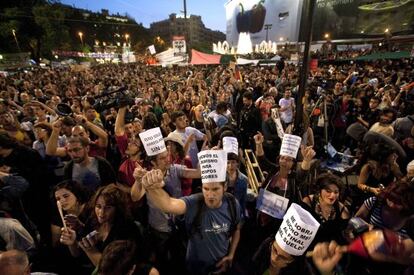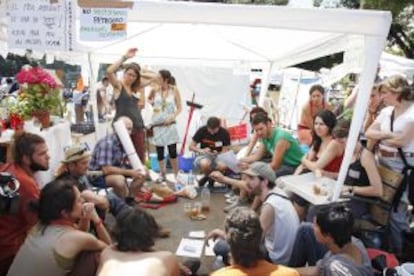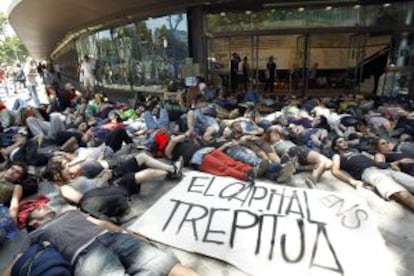15-M, four years on: caught between rupture and regeneration
EL PAÍS asked participants of the Indignados movement to explain their leap into politics

Ever since May 15, 2011, Spain has undergone an unexpected social and cultural change, one that is unique to Europe. The Indignados movement, as it came to be called (or more commonly in Spain, 15-M), is essential to a proper understanding of this country’s current political crisis.
Throughout these four years, the movement has evolved. Lately it appears to have adopted a political shape, with some members attempting the leap into government institutions.
How is this evolution coming along? What will it lead to? Will politics itself undergo a generational renewal? Will it break with the past? Will there be any significant changes at all?
As Spain prepares for local and regional elections on May 24, EL PAÍS asked several people who joined the 15-M protests, and are now either members or witnesses to the birth of new political parties, to answer two questions that aim to resolve these issues.
QUESTIONS:
1. Was it logical for the 15-M movement to make the leap into government institutions?
2. What will this step contribute to local politics? Will it represent a renewal? A break?
Ada Colau, who gained national attention by heading the anti-home eviction movement Mortgage Victims Platform (PAH), is now a mayoral candidate in Barcelona with the coalition Barcelona en Comú. “On 15-M I was at the demonstration with my son, who was only a month old. He was born on April 15,” she notes.
1. “It is a logical and necessary step, even though things do not end with elections. First we take back the towns, then we take back the institutions to democratize them and put them at the service of the common good. Later the work will have to continue, inside and outside the institutions, in order to exercise real democracy and sovereignty.
It’s not about renewal or rupture; the central idea is to make government institutions focus on the social majority and to govern for them. To let fresh air in
José Manuel López Rodrígo
2. It’s not that the process will contribute something in future; it’s already contributing, it’s already a break with the past. For the first time in decades, people are taking center stage, and for the first time, the outcome of elections is not predictable.
Xavier Domènech Sampere, a historian at Barcelona Autonomous University (UAB) and author of Hegemonies, resistance movements and political processes, is a member of Procés Constituent, a Catalan left-wing movement that seeks regional independence and the end of capitalism. “During the week of May 15, 2011 I was at the protest, and soon after that I was at Plaza Catalunya in Barcelona.”
1. I would not talk about a logical step, in the sense of cause and consequence, but rather about related phenomena that are part of the same bigger picture: a crisis of legitimacy that could derive into a regime crisis. In my view, 15-M underscored the intensity of that crisis in a spectacular way, and created the foundations for a new, long-term social, cultural and political cycle.
2. The ability of old politics to remain in power rests on the belief that there are no alternatives, only different combinations of the former. The construction of an alternative socioeconomic and political reality requires plausibility, and local experiences can play a fundamental role here by creating new principles of plausibility in an interconnected way.
Íñigo Errejón is the political secretary for Podemos, the new anti-austerity party that has risen to the top of voter intention despite being less than two years old. “On the afternoon of 15-M I had just returned to Madrid after teaching some classes in Quito. I swung by the demonstration while awaiting another one, and on May 18, the day that election authorities banned the protest in Sol Square, I showed up after defending my dissertation.”

1. It was not a necessary step. Nowhere was it written that it had to happen. On one hand, some of the contents, demands and “styles” of 15-M had already reached government institutions. Some of the people in power acknowledged that they had to adopt some of 15-M’s demands in order to renew their own legitimacy. On the other hand, in a situation where you have a regime crisis but not a state crisis, no protest or counter-power outside the institutions is going to be enough to trigger political change. That is why there have been initiatives within the state itself.
2. Both things. The tension between a break and an extended renewal of the existing order cannot be resolved ethically or esthetically. It’s not a matter of personal or ideological preferences. It is the result of a balance of power between the ability of the leading sectors to contain, disperse and integrate; and the ability of those working for change to regroup, seduce and articulate a new popular will that aims to build a national project with social majorities at its heart.
Marina Garcés is a philosopher and lecturer at Zaragoza University. Her latest book, Un mundo común (or, A common world), is the driving force behind the think tank Espai en Blanc. “I spent 15-M between Plaza del Pilar and Plaza Catalunya. On June 27 [when the Catalan police tried to break up the sit-in in Barcelona] I screamed: ‘If Barcelona is not afraid, Madrid has no reason to be’ as I stood in Sol square.”
The need to have a significant impact on what is traditionally referred to as “power” is a prerequisite for any movement seeking reform or change
Emmanuel Rodríguez
1. I don’t feel that what we are witnessing is the 15-M movement’s leap into government institutions. 15-M questioned our political representation and delegation, and opened up the possibility of politicizing all fronts and dimensions of life. Our current electoral challenge is more about a necessary change within party systems, while accepting their limits and conditions.
2. Rather than a renewal or a rupture, I call it an interruption: the new electoral platforms are a necessary tool to interrupt the destructive logic of capitalism and its political parties. From this point on, we face the task of taking charge of our own lives again and transforming them. This is the challenge that 15-M issued on the streets and in the workplaces and in our living spaces, and that is where it must continue to speak to us.
José Manuel López Rodrigo is an agronomist and a member of several non-profits, including Cáritas and Fundación Tomillo. He is also director general of the public foundation Pluralismo y Convivencia, which answers to the Justice Ministry, and the Podemos candidate to the regional premiership of Madrid. “On 15-M I was in Madrid taking part in some of the demonstrations.”
1. Citizens took to the streets to show an indignation that was not homogeneous: it was political but also economic, social, cultural, educational... Political elites ignored it, and their only reply was that politics must be engaged in only by parties. The cycle of mobilizations resulted in local initiatives and the creation of Podemos, which came up with an accurate and socially acceptable diagnosis of the crisis. So moving on to a period of proposals was a logical thing to do.

2. It’s about moving from a reactive position –“destitutional” – to defend health, education or jobs into a proactive position –“constitutional” – in order to improve health, education and jobs. It’s not about renewal or rupture; the central idea is to make government institutions focus on the social majority and to govern for them. To let fresh air in.
Emmanuel Rodríguez is a publisher and essayist. His latest book is ¿Por qué fracasó la democracia en España? (or, Why did democracy fail in Spain?) “On May 15 I was at the demonstration. Afterwards, I was an active witness to the sit-ins at Sol.”
1. The need to have a significant impact on what is traditionally referred to as “power” is a prerequisite for any movement seeking reform or change. However, the crux of the matter lies in the way this move into the institutions should take place: via elections and progressive politics? By pressuring government institutions in order to transform them (democratize them) in the constituent sense of the word? Or through electoral positions viewed as political counterbalances that are organically connected to social mobilizations?
2. The balance of political change is currently oscillating between a constituent process (democracy, an end to austerity), which was articulated as a common demand on 15-M, and a democratic regeneration, conceived as a change in the elites, control over corruption and a new meritocracy. Local processes (regional and municipal), no matter how much self-rule they may enjoy, are still facing the same dilemma.
Raimundo Viejo Viñas is a university professor and an independent publisher. He is also a member of Podem and a candidate for Barcelona en Comú. “On 15-M I was at the squares, first in Sol, where by coincidence I was with Pablo Iglesias and Íñigo Errejón, and later in Catalunya.”
1. More than a step, I see it as a logical interference: the current regime is not the regime desired by the 15-M movement. The complete lack of dialogue on the establishment’s part has forced the movement into the regime’s institutional arena. It was the regime’s authoritarianism that triggered this electoral leap. But the deployment of the movement’s political side involves not leaving the legislative machine to one side, as though the effects of public policy did not concern us. This requires empowerment, other organizations, other practices. Parties are not the answer, but neither is the old type of activism. We have entered a period of intense democratizing mutation in the way politics are conducted.
2. There is a tension between both. There will be incentives to be accommodating, but not as much as in the 1980s. We are already witnessing some mutations: elites going into retirement (beginning with King Juan Carlos I), new political groups (Ciudadanos), imitation of some of the movement’s solutions (ethics codes, term limits and so on). These changes will be more difficult within government institutions, because they will not only depend on the will of the people. We will have to learn to move in this difficult terrain. The key lies in always keeping one foot outside the door.
Tu suscripción se está usando en otro dispositivo
¿Quieres añadir otro usuario a tu suscripción?
Si continúas leyendo en este dispositivo, no se podrá leer en el otro.
FlechaTu suscripción se está usando en otro dispositivo y solo puedes acceder a EL PAÍS desde un dispositivo a la vez.
Si quieres compartir tu cuenta, cambia tu suscripción a la modalidad Premium, así podrás añadir otro usuario. Cada uno accederá con su propia cuenta de email, lo que os permitirá personalizar vuestra experiencia en EL PAÍS.
¿Tienes una suscripción de empresa? Accede aquí para contratar más cuentas.
En el caso de no saber quién está usando tu cuenta, te recomendamos cambiar tu contraseña aquí.
Si decides continuar compartiendo tu cuenta, este mensaje se mostrará en tu dispositivo y en el de la otra persona que está usando tu cuenta de forma indefinida, afectando a tu experiencia de lectura. Puedes consultar aquí los términos y condiciones de la suscripción digital.








































